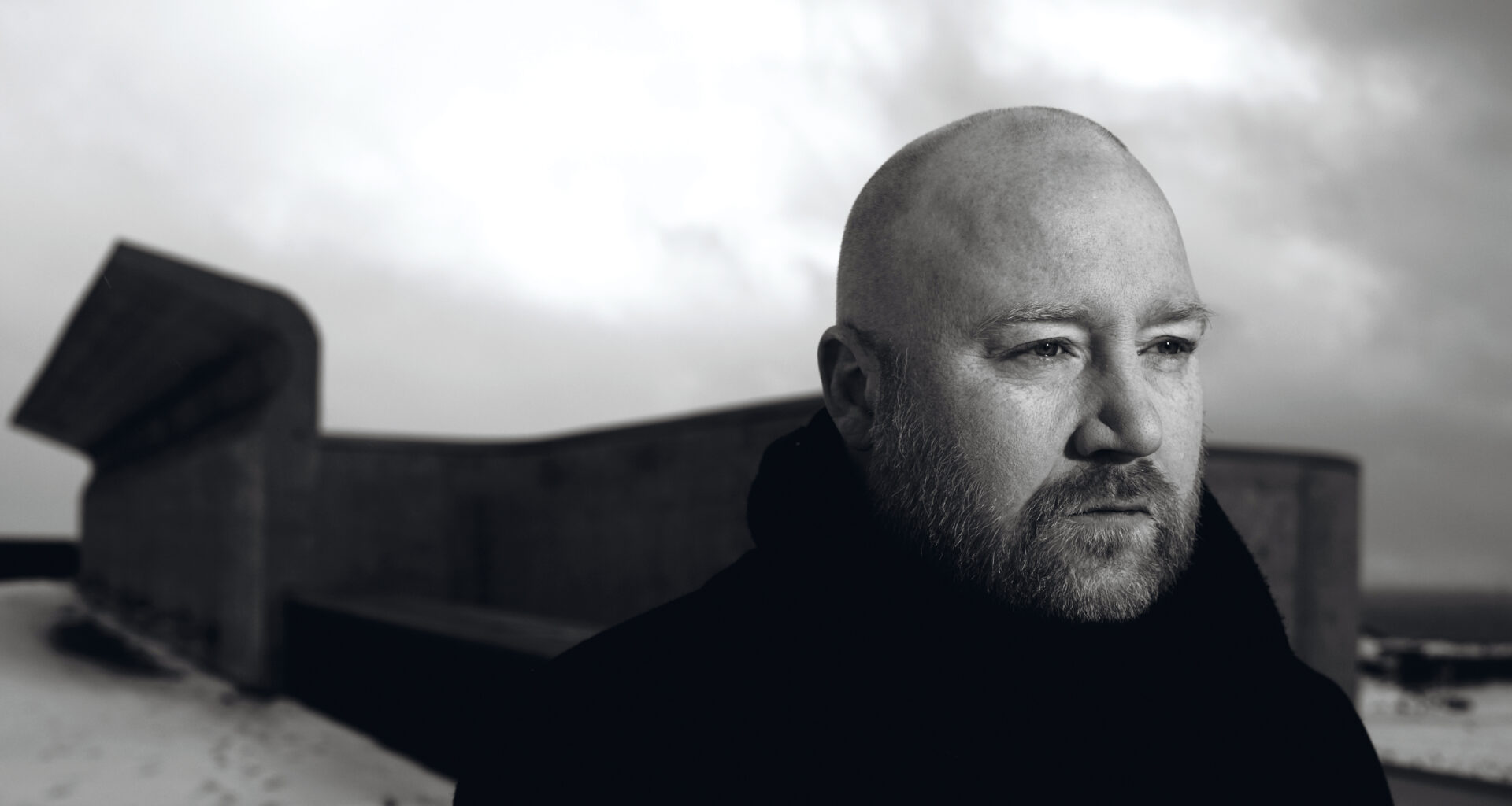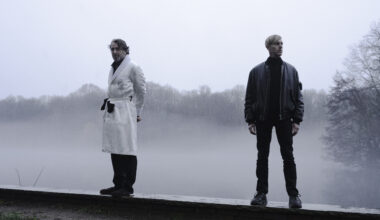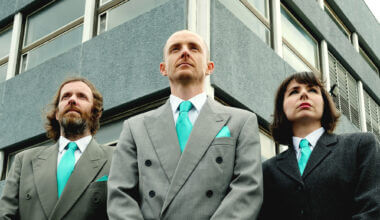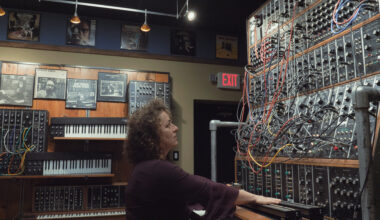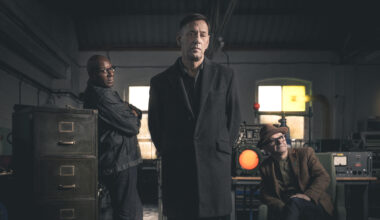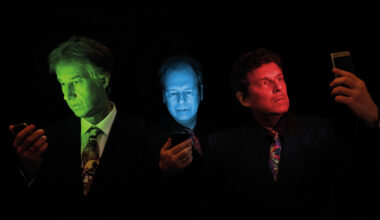Best keep an eye on Jóhann Jóhannsson, blink and it seems Iceland’s finest ups his game yet another notch. His ‘Arrival’ soundtrack was special, what can we expect from his work on the new ‘Blade Runner’ film due later this year?
From wonky synth wrangler with the Kraftwerk-influenced Apparat Organ Quartet, via his emergence as a solo composer with releases on Touch, 4AD, Fat Cat and Deutsche Grammophon to his current status as film soundtrack behemoth, the understated scores of Icelandic composer Jóhann Jóhannsson have notably been used by fêted film director Denis Villeneuve, on thriller ‘Sicario’, recent sci-fi smash ‘Arrival’ and the forthcoming ‘Blade Runner 2049’, the sequel to Ridley Scott’s 1982 masterpiece. He also scored the Icelandic murder mystery ‘Trapped’, which was aired on BBC4’s Saturday night Nordic noir slot we all used to love so much. Oh, and his work on Darren Aronofsky’s ‘Mother’, due this year, is the first Aronofsky film without a Clint Mansell score. His work suggests grandeur without being grandiose, and combines the sounds and moods of electronics and machinery with the orchestral.
How is ‘Blade Runner 2049’ coming along then, Jóhann?
“Well, the less said the better because we have to sign Non-Disclosure Agreements and so I can’t really say anything much. But I’ve been working on the score for quite some months already, which is normaI. I always start early, usually before filming starts. That doesn’t mean that I’m working on it every day, it just means that I’m doing research and looking for material. I’m recording and trying out ideas that I send to Denis Villeneuve, just starting a discussion really.”
It’s a big pair of boots to fill for everyone involved, the film and the soundtrack are both huge cultural landmarks.
“I’m a huge fan of the film, obviously, I first saw the film when it first came out. I mean, I’m old enough to have done so, I think I was 12 or 13 when I saw it, and I remember it vividly and I’ve seen it many times since. I’ve followed its evolution, how Ridley Scott slowly made his final director’s cut, and the score is obviously a huge part of the effectiveness and the mood of the film.
Did you take a closer listen to the original Vangelis score before you started work?
“Vangelis is a composer I admire tremendously and someone who has been an influence on what I do even though you might not hear it in an obvious way. What I love about the way he works is that he likes simple, strong statements and motifs and that’s something that I love as well. He uses space, or atmosphere, very well and he somehow manages to make things sound big and epic with just a few synthesisers and sequencers. He has also managed to create a sound that’s totally his own.
Is the film an important part of your own cultural background like it is for so many people?
“‘Blade Runner’ has been a part of my life since I first saw it, and I’m also a huge Philip K Dick fan. I’d already read the book by the time the film came out. I was an early sci-fi literature nerd and I’d read quite a bit of Philip K Dick. So this is obviously an exciting project for me to do and especially with a director like Denis, who I think is one of the few people who could actually pull this off.”
Do you feel a little daunted by how iconic the original is?
“You know, it’s a tremendous challenge to take on and to take on something as – the word iconic is overused, but it’s certainly applicable to that film and to that score. You have to basically try your best not to mess it up. Everyone working on this film is very aware of the legacy of the original. But this is not a remake, this is a sequel and hopefully it will stand on its own.”
When you were 12 or 13 in Iceland, what other influences were reaching you there?
“I was quite heavily into electronic music back then, because Kraftwerk were having their heyday with ‘The Model’ and ‘Computer World’ and ‘Tour De France’. Through that, I discovered Tangerine Dream and krautrock and eventually Neu! and Can. So those were very early influences alongside things like Jean-Michel Jarre. I’m not shy about admitting that I enjoy a bit of Jean-Michel Jarre now and then.
Those Kraftwerk ripples made it everywhere didn’t they?
“Kraftwerk have been a huge influence on me, again maybe not in an obvious way, but more in a philosophical way about how they work with ideas and concepts. My albums tend to revolve around concepts and ideas and I’ve used vocoders quite a lot, I’m quite obsessive about vocoders and very interested in them. I used them a lot in Apparat Organ Quartet. I’m largely responsible for the vocals on those albums and they were usually a combination of vocoders or electronically or computer-created voices.
One of the elements that set Kraftwerk apart was how they worked with the sounds themselves, and the space around those sounds. Your use of sound and silence also seems very considered.
“I’ve always used silence and I think it’s a very important element you can use as a composer. My ‘Englabörn’ album was very influenced by Morton Feldman, and the way that he uses silence and his compositions. On my most recent album, ‘Orphée’, I’m working with that a little bit as well. And in my scores, ‘The Miners’ Hymns’ for example, there are very often these long, maybe not silences, but there’s a lot of space between the phrases. It’s about giving yourself time to make the statement and let the motif or the phrase resonate.
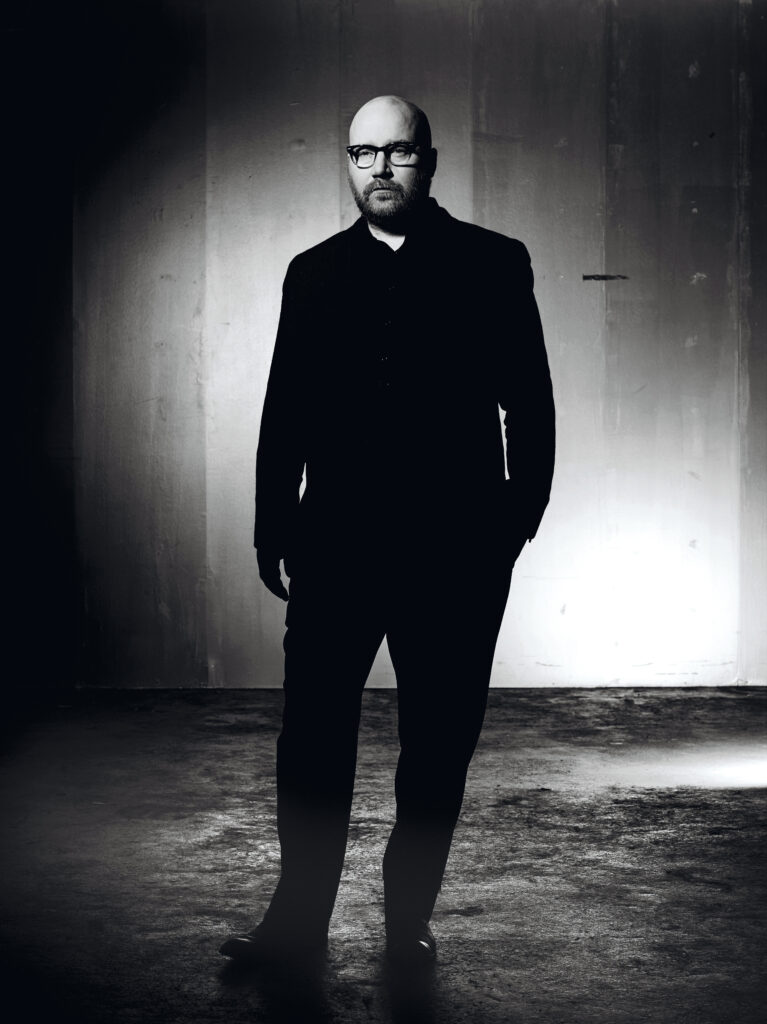
And, also like Kraftwerk, machines figure very strongly in your back catalogue too don’t they?
“It’s a recurring technique that I use. You can hear it on ‘Orphée’, with the number stations, which are recordings of number station voices, but treated and put it into a reverberant space, which, maybe subconsciously, was influenced by ‘Blade Runner’.
So in a way, you’re coming full circle with the new soundtrack?
“There’s this scene in ‘Blade Runner’ that I love very much where Rachael [the female replicant] is in a meeting in a room in this enormous building with the head of the Tyrell Corporation. They have this conversation, and their voices are like they’re talking inside a cave, it’s very striking. The sound design on the original film is one element that’s not talked about a lot. It’s absolutely amazing, there’s constantly little ideas going on and obviously, it works very well with Vangelis’ music. That scene stayed with me for a long time, and I used that idea on my ‘IBM 1401, A User’s Manual’ album, for example. I put that voice in a very large space and I’m doing the same thing with the number stations voices in ‘Orphée’. “
So how did your listening develop from listening to Kraftwerk aged 12 to making music yourself?
“I had three older sisters, and my parents listened to a lot of classical music. Beyond what was heard on pop radio or whatever, my sisters and my sisters’ boyfriends’ record collections contained the first real music I was exposed to. They had Kraftwerk records, Tangerine Dream, they even had the first Velvet Underground record and I was listening to that when I was like 11… but only the first side, the melodic side. I wasn’t really ready to appreciate the ‘The Black Angel’s Death Song’.”
That sounds like an interesting education, where did listening like that at such a young age take you next?
“After that I started listening to a lot of older music, early David Bowie records, The Doors and stuff like that, but then contemporary music started to interest me, and I heard bands like The Jesus And Mary Chain and Loop, all that pre-shoegaze wall of sound guitar thing. I was fascinated by it and that’s the kind of music I started making.
What did you have at your disposal for your first adventures in music making and how did they turn out?
“I had a guitar and a big amp and a bunch of fuzz pedals and a four-track and I just made these layers of fuzz guitars and feedback, it was very minimal, kind of almost like Suicide, who were another early influence. It was around that time that I discovered the American bands, Big Black and Sonic Youth and things like that. I had a band when I was 18, and we’d play shows with The Sugarcubes in Iceland, before they became big. That was a very interesting time.”
Iceland has a rich vein of contemporary music making. Did it help you developing as a musician there?
“The late 90s and early 00s were especially interesting with bands like Sigur Rós and Múm appearing. All throughout the 90s I’d been developing a sound that combines classical or acoustic orchestral instruments with electronics. I’d also started working with ensembles and doing commissions, for theatre especially.”
How did the interest in orchestral music develop?
“I don’t come from a classical background, I’m much more from an alternative, underground electronic background in terms of music. I think I gravitated towards using these so-called classical instruments purely as a another colour and to expand my palette. I studied piano, but everything else, orchestration and writing for orchestra, composing, that’s something that I’ve learnt on my own through reading books and listening to music and through some tutorship from various people. So I have a fairly unusual background in that sense.”
Now you are recording for Deutsche Grammophon, do you consider yourself a classical composer?
“I’m not a classical composer. I’m not a neo-classical composer. I’m just a composer writing music. Sometimes I write music for films and sometimes I write music for my own projects and I try to keep that balance fairly even. “
The balance seems to be more on film side lately, publicly at least?
“I have mainly been releasing soundtracks recently, but I have been working on personal projects all this time and they are coming out in the next few years. I tend to be approached to write music for films because of my solo albums. There are people who make a career out of being film composers and there’s nothing wrong with that, and there are people who do that very, very well, but that’s not something I want to do, it’s not something I’m interested in.”
‘Orphée’ and ‘Arrival’ are both out on Deutsche Grammophon
